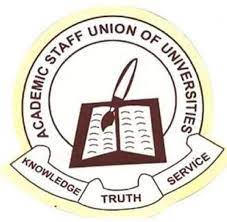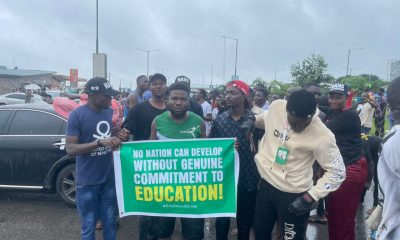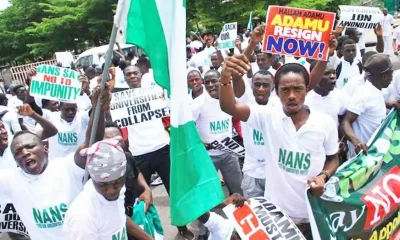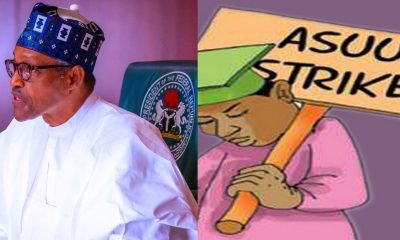Education
ASUU Strike: Parents, Candidates turn to Private Universities for Admission

Many parents and candidates seeking admission into the universities for the 2022/2023 academic session have shifted their interest to private universities.
Newsmen report that survey in Abia shows that private universities have become feasible alternatives due to the lingering strike by lecturers in public universities.
The nationwide action by the lecturers, under the aegis of the Academic Staff Union of Universities (ASUU), has paralysed academic activities in all the federal universities in the country since Feb. 14
The unfortunate development, which has become perennial in the country, appears to have betrayed the people’s confidence in public universities.
Worried by the scenario, many admission seekers in the country, aided by their parents and guardians, have now resorted to private universities.
At Madonna University, Okija in Anambra, the Public Relations Officer, Mr Emeka Okpara, said that most of the courses offered in both the Elele and Okija campuses of the institution were fully subscribed to in the just-concluded academic session.
According to Opara, since JAMB released the 2022 results, many people have been calling to enquire about our admission requirements.
A lecturer in the university, who pleaded anonymity, said the school had already exceeded its quota in some of the courses.
He said that the institution presently stood the risk of being sanctioned by the National Universities Commission (NUC).
At the Tansian University, Umunya in Anambra, a member of staff in the Admission Department said that the university was already experiencing an upsurge in the number of admission seekers.
“We have had good students’ enrollment since the university was established about 15 years ago.
“However, the level of enrollment increased last year,” he said on the condition of anonymity.
He ascribed the development to the ongoing industrial action by ASUU, in addition to the “excellent academic performance” by the institution.
Mr Lawrence Nwaimo, who is seeking admission to Paul University, Awka, said the school had commenced admission for the 2022/2023 academic session.
Nwaimo said that there were many candidates struggling to gain admission due to the limited chances in the institution.
“I have been going to the university since last week and I usually met a crowd of people in the admission office each time I came there,” he said.
In Ebonyi, the Public Relations Officer, Evangel University, Dr Thenz Nwali, said that the incessant strikes by ASUU and Non-Academic Staff Union in public universities led to more students seeking admission into the institution.
An official in the university’s Admission Department also said on the condition of anonymity that many candidates were coming to the institution to seek admission.
He said: “The incessant strikes in the public universities have pushed up students enrollment in our school.
“Even the candidates who did not have our institution either as first or second choice are coming to seek admission here.”
In Abia, the Vice Chancellor, Clifford University, said that the 2021/2022 academic session had just ended and that enrollment for the 2022/2023 session had yet to commence.
“We will begin to enroll new students in October.
“That is when we will start to see the impact of the strike, whether there is an improvement or not.
“So, for now, we do not know what the impact of the strike will be on the enrollment of students,” Omeonu said.
He further said that available statistics from the previous enrollments did not show any increase as a result of ASUU strikes.
Also, Prof. Ambrose Ugbogu, the Vice Chancellor of All Saints University of Theology and Seminary, said that the statistics of the university’s enrollment had not revealed any increase in the past six months.
Ugbogu said that the charges by private universities could be one of the factors discouraging students from switching from public to private universities.
“Also, those who were already admitted into public universities would not want to relinquish their admission,” he said.
He, however, admitted that some undergraduates and parents might begin to contemplate changing institutions, should the strike linger into the commencement of the 2022/2023 academic session.
Mr Sleek Ogwo, the Principal Assistant Registrar/Head, Media and Public Relations, Gregory University, Uturu, said that it would be difficult to give any statistics of enrollment, when admission for the 2022/2023 had not begun.
Ogwo said that the university had just concluded its 2021/2022 session and would soon begin the admission process.
“We can only ascertain whether there is an increase in enrollment compared to our previous records around October, when we should be done with admission,” he said.
A parent, who identified herself as Mrs Gloria Duru, said that she had lost interest in public universities because of the incessant disruptions in academic activities due to industrial disputes between ASUU and the Federal Government.
Duru said that the private universities had provided an alternative, provided one could afford the financial resources.
She said that she had been able to secure admission for two of her children at both Cliford University and Gregory University, Uturu.
In Imo, Rev. Fr. Emeka Iheme, a Lecturer at the Department of Philosophy, Claretian University of Nigeria, Nekede, near Owerri, said the institution was expecting more than double the number of students admitted in the last session.
Iheme said that the university admitted at least 71 students in their first academic session in 2021, when the institution was established.
He said that at least 300 prospective students had so far enrolled for the next session billed to commence in October.
He argued that the ASUU strike could be a factor since parents and guardians were confident that their children and wards would graduate in record time in private universities.
He further opined that the increase in the number of the university’s enrollment could be attributable to the introduction of new courses scheduled to start next session, following their accreditation by NUC. (NAN)
Education
Educationist Advocates Strong Monitoring Structure for IDP Education
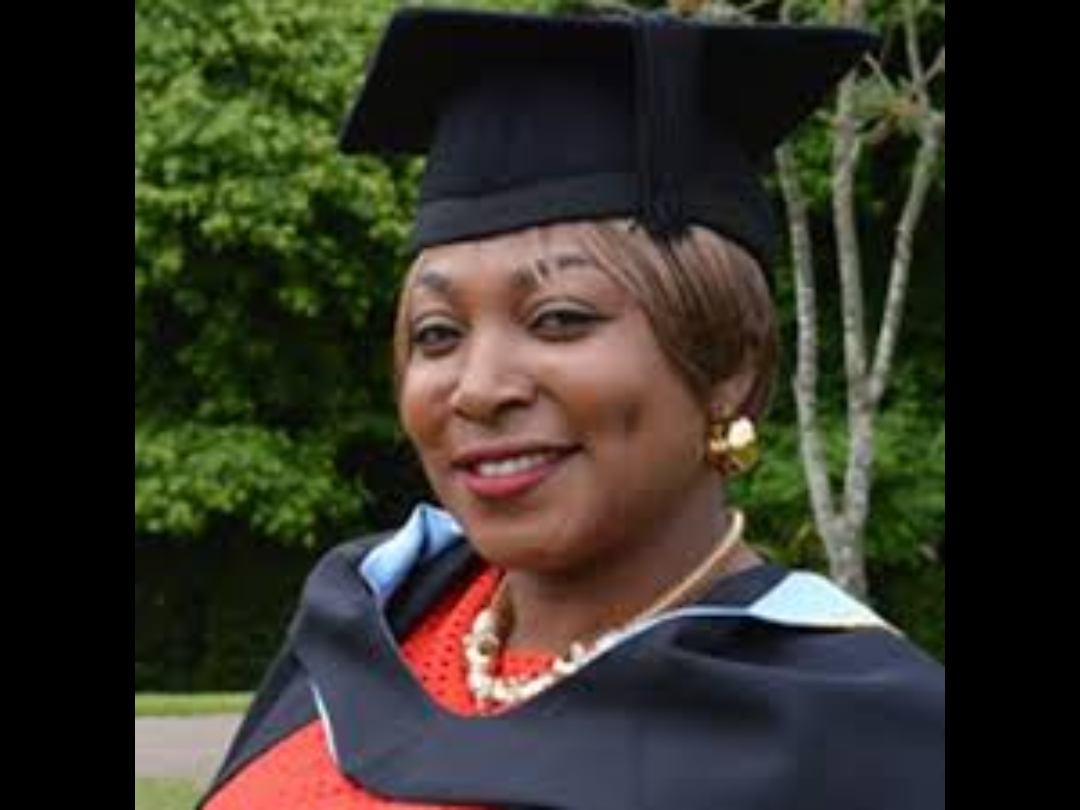
A lecturer at the University of Southampton, UK, Dr Vivienne Rwang has called for the establishment of monitoring structures to strengthen the implementation of Nigeria’s Universal Basic Education (UBE) policy for displaced populations.
Rwang made the call on Tuesday during a virtual seminar themed, “Improving Educational Access and Quality for Displaced and Marginalised Learners in Nigeria: A Policy and Practice Approach”.
It was hosted by the Southampton Education School, University of Southampton, UK.
She said findings from her academic study revealed the severe challenges faced by internally displaced children in accessing quality basic education in camps across North Central and North East Nigeria.
“Education is more than a right; it is a tool for stability, healing, and hope. We owe these children that much,” Rwang stated.
Citing global statistics, she noted that Sub-Saharan Africa accounts for 46 per cent of conflict-induced displacement worldwide, with Nigeria representing a significant portion due to prolonged insurgency and communal violence.
Rwang called for urgent reforms to Nigeria’s UBE framework, including the formal recognition of IDP camps by federal and state governments, dedicated education budgets for displaced children, and curriculum reforms in teacher training to integrate emergency education.
She further advocated for free education for IDP children, including the waiving of Parent-Teacher Association (PTA) fees, and the provision of uniforms and learning materials.
“In spite of Nigeria’s UBE policy mandating free and compulsory basic education, many IDP children remain excluded,” she said.
According to her, many IDP camps lack functional schools, while displaced children who attempt to enrol in neighbouring schools often face rejection, high fees, or non-absorption due to overcrowding or lack of documentation.
She also highlighted the shortage of trained teachers capable of addressing the psychosocial and educational needs of traumatised children, noting that most IDP schools operate without special budgetary allocations.
“Teachers working in and around camps often lack the training, motivation, and resources to meet the needs of displaced learners.
“Without education in emergency training, we risk losing an entire generation, ”Rwang added.
In her keynote address, Prof. Nana Tanko, Co-founder of the African Policy Research Institute, called for urgent action to support the education of children in conflict-affected states.
She stressed that collective efforts are needed to lift them out of their current circumstances.
Deputy Vice Chancellor, University of Jos, Prof. Rahila Gowon alongside other academics from the institution, also emphasised the need for a complete overhaul of Nigeria’s education system to better accommodate marginalised learners.
Also speaking, Simon Katu, Assistant Director of Disaster Risk Reduction at the National Emergency Management Agency (NEMA), advocated for the integration of education in emergencies into national and state disaster management frameworks.
He said this would help institutionalise the Safe School Initiative and ensure more consistent interventions.
Rwang’s research is titled “Quality Basic Education and Provision for Internally Displaced Children in Internally Displaced Persons Camps: A Case Study of IDP Camps in North Central and Northeast Nigeria”.
It was motivated by her volunteer work in IDP camps and findings from her master’s dissertation on public primary education in the Federal Capital Territory (FCT).
Representatives from the Universal Basic Education Commission (UBEC), International Organisation for Migration (IOM), Hope for All Foundation, Lovatt Foundation, and various school administrators also participated in the seminar.
Education
Philanthropist Olusoji Approves Full Scholarship for 100 Kogi COE Students
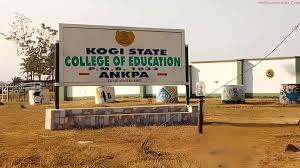
The act of generosity displayed by Asiwaju Prince Olatunji Olusoji, the Bashorun Akinjagunla of Ogidi, has not only put smiles on the faces of 100 students at Kogi State College of Education (Technical), Mopa, but has also earned him recognition as a key partner and friend of the institution.
He offered full sponsorship to 100 students of the institution, covering tuition and accommodation for the three-year academic programme.
The gesture was met with gratitude and appreciation from the Provost of the College, Dr. M.K Ibrahim, and the State’s Commissioner for Education, Hon. Wemi Jones.The College Provost particularly appealed for further partnerships, including an educational endowment and support for the construction of a College Clinic, which Prince Olusoji graciously agreed to consider.
For his part, Commissioner Jones commended the philanthropist for his dedication to educational advancement and community development, emphasising the government’s commitment to the growth of Kogi State College of Education (Technical), Mopa.
Prince Olusoji’s immediate approval and release of funds for the scholarship, as well as his pledge to assist with the clinic project, demonstrated his strong belief in the power of education and the importance of giving back to the society.
As a token of appreciation, the Provost and the Education Commissioner decorated Prince Olusoji as a ‘Friend and Partner of the College’, solidifying his status as a valuable ally in the pursuit of academic excellence and holistic development.The generous gesture of Asiwaju Prince Olatunji Olusoji serves as a shining example of how individuals can make a significant impact on the lives of others through acts of kindness and philanthropy. His commitment to supporting education and community welfare is a beacon of hope for the future generations of Kogi State and beyond.
Education
NYSC DG Tasks Corps Members on Patriotism, Selfless Service Others

The Director General of National Youth Service Corps (NYSC), Brigadier General Olakunle Nafiu has advised Corps members to allow the core values of the scheme be their guiding principles during and after their service year.
He said patriotism, integrity, efficiency, transparency, consistency, loyalty, discipline, diligence, selfless service among others are necessary requirements for a successful service year.
General Nafiu disclosed this while addressing the 2025 Batch ‘A’ Stream Two Corps members at the Cross River State Orientation Camp in Obubra and Ebonyi State Orientation Camp at MacGregor College,
Afikpo, a statement by the acting Director Information and Public Relations, NYSC, Caroline Embu, said on Sunday.
He said every Corps member must adhere strictly to the scheme’s bye-laws, constitution of the country and also respect constituted authorities.
“Be at your best at all times. Be diligent and punctual at work, don’t be lazy and serve as our good ambassadors,” the DG said.
The NYSC Cross River State Coordinator, Joke Oyenuga in her camp situation report informed General Nafiu that 1,455 Corps Members consisting of 675 males and 780 females took the Oath of Allegiance, which was administered by the High Court Judge of Obubra, Hon. Justice EA Ubua during the swearing-in ceremony.
She added that “the morale among the staff and Corps Members is very high and they were all committed to getting the best results.”
Similarly, the NYSC Ebonyi State Coordinator, Foluke Oladehinde said 1,525 Corps members comprising 765 males and 760 females were registered while the Oath of Allegiance was administered by Hon. Justice Nicholas Nwode on behalf of the Chief Judge of the State.



